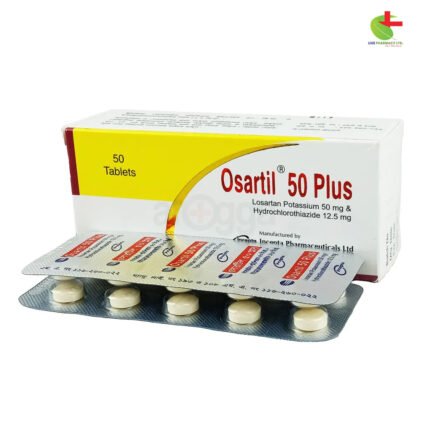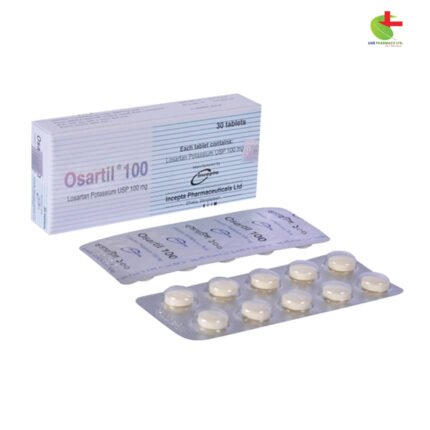Osartil 25
50.00৳ Strip
- Osartil is an effective antihypertensive medication containing Losartan Potassium for treating high blood pressure.
- It provides renal protection for type-2 diabetic patients with proteinuria, slowing the progression of kidney disease.
- The medication works by blocking angiotensin II receptors, reducing vasoconstriction and aldosterone release.
- Always consult a healthcare professional before use.
 Brand
Brand
|
Incepta Pharmaceuticals Ltd |
|---|---|
 Generics
Generics
|
Losartan Potassium |
 Type
Type
|
Tablet |
Indications
Hypertension: Osartil is prescribed for the management of hypertension, and it can be used alone or in conjunction with other antihypertensive medications, such as thiazide diuretics.
Renal Protection in Type-2 Diabetic Patients with Proteinuria: Osartil is effective in slowing the progression of kidney disease in hypertensive patients with type-2 diabetes who have proteinuria, indicated by a urinary albumin-to-creatinine ratio exceeding 300 mg/g.
Consult a registered healthcare professional before use.
Pharmacology
Losartan Potassium is the first non-peptide, orally active angiotensin II receptor blocker. It selectively binds to the AT1 receptor located in various tissues—including vascular smooth muscle, adrenal glands, kidneys, and the heart—thereby reducing key biological actions such as vasoconstriction and aldosterone release, which contribute to hypertension.
Dosage & Administration
For most patients, the recommended starting and maintenance dose is 50 mg taken once daily. If this dose does not achieve adequate antihypertensive effects, it can be adjusted to 25 mg twice daily before increasing further. Patients with intravascular volume depletion (e.g., those on high-dose diuretics) may start with 25 mg once daily. Losartan can be administered either once or twice daily, with total daily doses ranging from 25 mg to 100 mg.
- Patients up to 75 years: No initial dosage adjustment is needed.
- Patients over 75 years: A lower starting dose of 25 mg once daily is advised due to limited clinical experience in this age group.
Consult a registered healthcare professional before use.
Interaction
Concurrent use of rifampicin or fluconazole may reduce the levels of Osartil’s active metabolite. Co-administration with hydrochlorothiazide may enhance antihypertensive effects. Caution is advised when using potassium-sparing diuretics (such as spironolactone, triamterene, amiloride), potassium supplements, or salt substitutes containing potassium, as this can lead to increased serum potassium levels. The antihypertensive effect of losartan may be diminished by non-steroidal anti-inflammatory drugs like indomethacin. Using ACE inhibitors, angiotensin receptor antagonists, anti-inflammatory medications, and thiazide diuretics together may elevate the risk of renal impairment.
Contraindications
Losartan Potassium is contraindicated in pregnant women and those with hypersensitivity to any ingredient in this medication. It should not be used with Aliskiren in diabetic patients.
Side Effects
Side effects associated with Osartil are generally mild and transient. Commonly reported side effects include dizziness, diarrhea, nasal congestion, cough, and upper respiratory infections. Less frequent effects may include fatigue, edema, abdominal pain, chest pain, nausea, headaches, and pharyngitis.
Pregnancy & Lactation
Classified as Pregnancy Category D, the use of Losartan Potassium during the second and third trimesters poses risks to the fetus. It is unclear whether Losartan is excreted in breast milk; therefore, a decision should be made on whether to discontinue nursing or the medication, considering the mother’s health needs.
Precautions & Warnings
Using Osartil in the second and third trimesters of pregnancy can adversely affect fetal renal function, increasing the risk of morbidity and mortality. Patients with intravascular volume depletion may experience symptomatic hypotension. Caution is advised in cirrhotic patients, as they may have significantly elevated plasma levels of Osartil. Changes in renal function, including renal failure, have been reported in patients with pre-existing renal impairment.
Use in Special Populations
- Renal Impairment: No initial dosage adjustment is needed for mild renal impairment (creatinine clearance 20-50 ml/min). For moderate to severe impairment (creatinine clearance <20 ml/min) or patients on dialysis, a starting dose of 25 mg once daily is recommended.
- Hepatic Impairment: Consider a lower dose for patients with a history of liver issues. Osartil can be taken with or without food and may be combined with other antihypertensive agents.
Therapeutic Class
Angiotensin II receptor blocker
Storage Conditions
Store in a dry place, away from light and heat. Keep out of reach of children.













Reviews
There are no reviews yet.